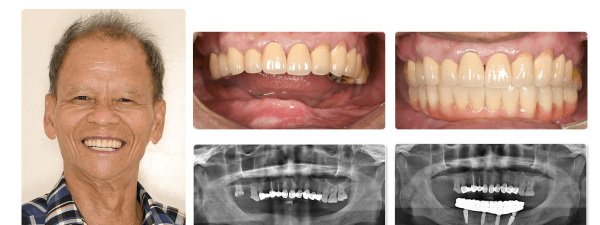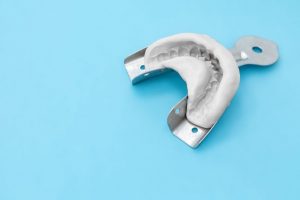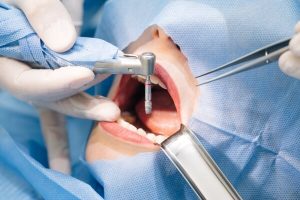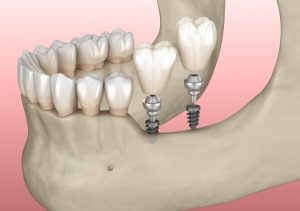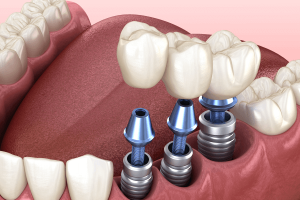Table of content
To address tooth loss due to natural aging, which affects chewing ability and quality of life, many elderly individuals seek information on tooth replacement services at Elite Dental. So, how much does tooth replacement for the elderly cost, and which method is the most suitable? Let’s explore further.
1. Should elderly individuals replace missing teeth?
As people age, natural aging processes accelerate, leading to the weakening and eventual loss of teeth. However, many elderly individuals overlook this issue, believing it is a natural part of aging and that replacing teeth is unnecessary at their age.
Nevertheless, missing teeth, regardless of age, can lead to unpredictable complications. For the elderly, tooth loss can result in:
- Reduced chewing function: Missing teeth make it challenging for elderly individuals to chew properly, leading to insufficient nutrient intake and a subsequent decline in overall health.
- Jaw misalignment: Gaps left by missing teeth cause adjacent teeth to shift from their original positions, leading to misaligned bites and imbalanced jaw structures.
- Jawbone resorption: Daily chewing stimulates the jawbone. However, tooth loss hinders this activity, resulting in jawbone resorption (degeneration of the jawbone).
- Facial aging: Prolonged tooth loss without proper treatment can lead to jawbone resorption, imbalanced facial structure, sagging skin, and hollow cheeks, revealing wrinkles and making the individual appear significantly older.
- Speech difficulties: Missing teeth can cause elderly individuals to slur their speech or articulate words unclearly.
To avoid these complications, elderly individuals with missing teeth should consider restoration as soon as possible to maintain their health, improve chewing efficiency, and enhance overall well-being.

2. What are the tooth replacement methods for the elderly, and how much do they cost?
Several tooth replacement options are available for the elderly. Below are detailed explanations and pricing for various solutions:
2.1 Implants for the elderly: restoring chewing function almost like natural teeth
Dental Implant placement is an advanced restoration method and the most popular choice among elderly individuals. This technique restores both the appearance and function of teeth by embedding titanium posts into the jawbone to replace missing roots and attaching crowns on top.
Advantages:
- Restores up to 90% of chewing function, allowing elderly individuals to eat comfortably and stimulating jawbone activity to prevent resorption.
- High aesthetics; nearly indistinguishable from natural teeth.
- Implant posts are made from high-quality, biocompatible titanium, ensuring safety for the human body.
- Does not impact adjacent teeth, preserving natural teeth to the fullest extent.
- Long lifespan, potentially lasting a lifetime with proper care.
- Easy to clean like natural teeth, reducing the risk of oral diseases.
Disadvantages:
- High cost due to the complexity of the technique.
- Lengthy treatment time requiring close monitoring.
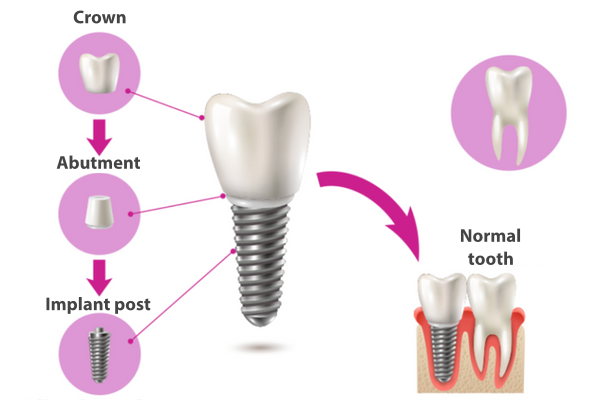
Implant cost:
| IMPLANT PACKAGE | COST (VND) |
| Implant Korea | 26,000,000 – 29,000,000 |
| Implant Hahn | 35,000,000 – 38,000,000 |
| Implant Neodent | 35,000,000 – 38,000,000 |
| Implant Straumann | 40,000,000 – 45,000,000 |
| Full-arch All On 4 Implant | 190,000,000 – 270,000,000 |
| Full-arch All On 6 Implant | 230,000,000 – 330,000,000 |
| Full-arch All On 8 Implant | 280,000,000 – 400,000,000 |
Note: The above costs include Implant posts, Abutments, and ceramic crowns.
>> Tips for you: Does Getting Dental Implants Hurt? What Factors Influence the Pain? Is Dental Implantation Dangerous? Potential Complications You May Encounter How long does dental implant surgery take and what factors affect it?
2.2 Dental bridges for elderly individuals
Dental bridges involve using two healthy adjacent teeth as support for a bridge of crowns, with a ceramic crown filling the gap where the tooth is missing.
Advantages:
- The color of the artificial teeth matches natural enamel, ensuring high aesthetics.
- Dental bridges are sturdy and can handle moderate chewing forces.
- Easy to clean.
- Long lifespan, typically 10–20 years or more with proper care.
- Quick treatment time, usually 3–5 days.
- Relatively affordable.
Disadvantages:
- Can only be performed if the two adjacent teeth are healthy and strong.
- Requires grinding down two healthy neighboring teeth, which weakens them and may lead to additional tooth loss over time.
- Does not prevent jawbone resorption, leading to facial deformation. As the jawbone gradually deteriorates, the bridge becomes loose, impairing chewing function.
- Improperly crafted bridges can cause bad breath.
- Only suitable for cases of one or a few missing teeth, not for full-arch restoration.
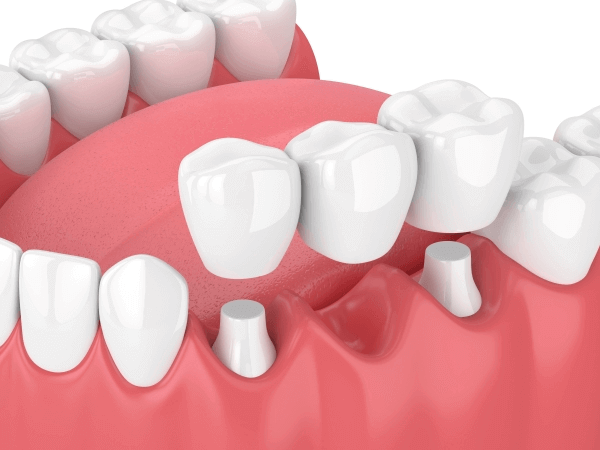
Cost of dental bridges:
| SERVICE | COST (VND)/TOOTH |
| Titanium crown | 3,000,000 – 3,600,000 |
| UNC all-ceramic crown | 5,000,000 – 6,000,000 |
| Zirconia all-ceramic crown | 8,000,000 – 10,000,000 |
>> Tips for you: How much do dental crowns cost? Where to get affordable price?
2.3 Removable dentures
Removable dentures are a traditional tooth replacement method suitable for restoring a single tooth, multiple teeth, or a full arch.
Advantages:
- Made from biocompatible and safe materials that do not cause irritation, ensuring user health.
- Simple and easy to remove or attach.
- Quick fabrication time, typically 2–4 days.
- Low cost.
Disadvantages:
- Weak chewing force, restoring only about 30–40% of natural chewing function, and unsuitable for hard, sticky, or tough foods.
- Lacks stability and may dislodge easily.
- Does not prevent jawbone resorption.
- Prone to bad breath due to a loose-fitting base, requiring frequent cleaning.
- Short lifespan, lasting only about 3–5 years.
- Low aesthetics, easily noticeable.
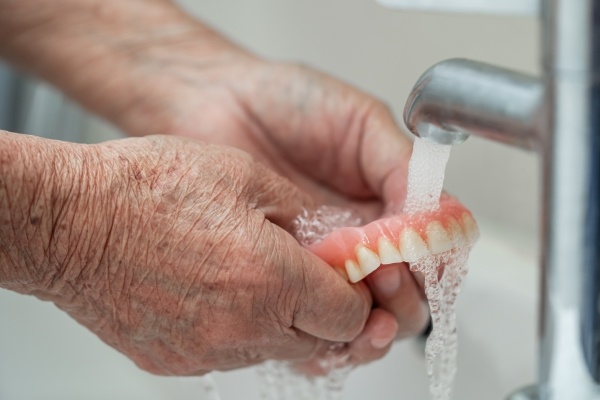
| SERVICE | COST (VND) |
| Full denture with acrylic teeth | 15,000,000 |
| Acrylic teeth | 1,500,000 |
| Composite teeth | 1,800,000 |
| Zirconia teeth | 1,800,000 |
| Temporary denture frame | 400,000 |
| Metal frame | 3,500,000 |
| Titanium frame | 5,000,000 |
| Elastic frame (1 quadrant) | 1,000,000 |
| Elastic frame (2 quadrants) | 2,500,000 |
3. Which tooth replacement method is best for the elderly?
Currently, Dental Implants are considered the optimal method due to their ability to restore chewing function almost like natural teeth and prevent complications like jawbone resorption. Especially for the elderly, Implants only need to be placed once and can last a lifetime, allowing them to enjoy eating and their golden years with ease.
Are Dental Implants dangerous for the elderly?
Before Implant placement, the dentist will perform a comprehensive oral examination to assess the quality and quantity of the jawbone. If the patient’s oral health is sufficient, the Implant procedure will proceed.
For elderly patients with existing dental issues, the dentist will first treat these conditions to eliminate risks before proceeding with the Implant placement or suggesting a more suitable restoration method. Thus, elderly customers can feel completely confident about the safety of the procedure.
However, as Implant placement is an advanced dental technique requiring a high level of expertise, it is crucial to choose a reputable dental clinic with skilled dentists and modern equipment to ensure safety.
4. Elite Dental – A specialized dental center with experienced dentists
Elite Dental is a trusted dental center chosen by customers of all ages. The clinic boasts a team of highly skilled dentists with over 10 years of Implant placement experience and continuous professional development through international training programs. To date, Elite Dental has successfully treated thousands of cases ranging from mild to severe tooth loss, restoring almost perfect chewing function with Dental Implant procedures.

When choosing Implant services at Elite Dental, customers can rest assured about the quality and genuine origin of the Implant posts and other dental materials.
Moreover, Elite Dental is equipped with advanced tools such as Implant placement support devices, Piezotome machines for reducing surgical trauma, CAD/CAM technology for minimally invasive procedures, and PRP centrifuge machines to minimize swelling and promote faster healing. This ensures that elderly customers feel comfortable throughout the procedure while achieving excellent results.
Testimonials from satisfied patients
Mr. Nguyen Dung (62 years old)
After two years of tooth loss and wearing removable dentures, Mr. Dung struggled to regain normal chewing function. Hearing about the expertise of the dentists at Elite Dental, he traveled from Nha Trang to Ho Chi Minh City to receive Implant treatment. Following a consultation and diagnosis, the dentist placed four Implant posts using the ProArch/All-on-4 technique. After the procedure, Mr. Dung was delighted to regain comfortable chewing ability after such a long time.
Ms. Cam Y
Ms. Y came to Elite Dental with severe tooth loss and significant jawbone resorption. Initially, her case was challenging because she refused two separate surgeries (bone grafting first and Implant placement later), which complicated the treatment plan. After carefully analyzing her X-rays and imaging data, Dr. Lam decided to combine angled Implant placement and bone grafting simultaneously.
This was a highly complex procedure requiring exceptional expertise and experience to succeed. In the end, the surgery was performed smoothly, and Ms. Y’s chewing ability was significantly restored.
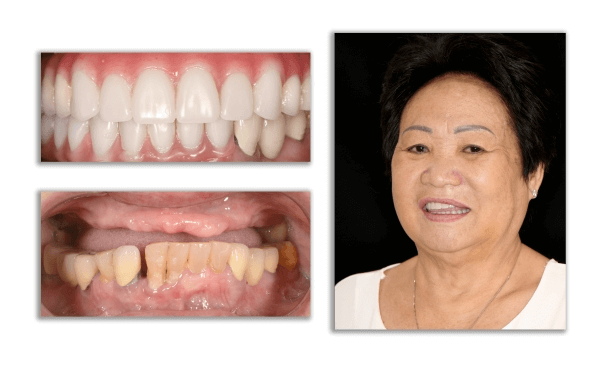
These are some of the most popular tooth replacement methods for the elderly today, particularly Dental Implants, which are highly favored. If you have any questions or need further assistance, don’t hesitate to visit this link to register for a consultation or call the hotline at 0902 559 888 for direct support.
>> Tips for you: Is it painful to get dentures? Which method is the least painful? How long does it take to get dentures from start to finish? How much do dentures cost? Average price in 2025


